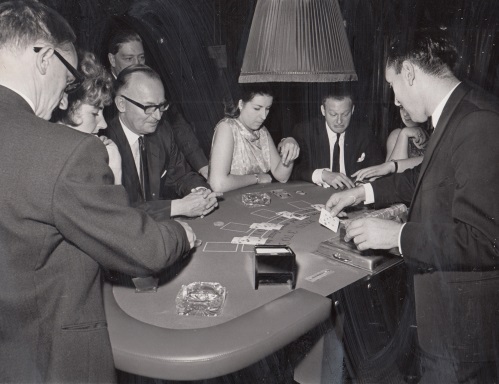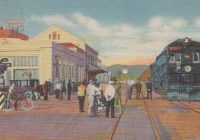|
Listen to this Gambling History blog post here
Getting your Trinity Audio player ready...
|

Gambling inside the Knightsbridge Sporting Club in London, England in 1965
1976
“Next time try London. The odds are better,” boasted a sign in the McCarran International Airport in Las Vegas in 1976. The posting of this ad and possibly others resulted from an agreement between gambling industry representatives in London and Las Vegas to “swap promotions and high roller lists” (Las Vegas Sun, Oct. 15, 1976).
People playing games of chance in Nevada, however, would’ve found doing so in England quite different and vice versa, as many of the rules concerning casinos were diametrical.
Conservative v. Liberal?
Some might argue that England took a more conservative approach to the industry, with tighter restrictions, than Nevada. The U.K. admittedly had adopted more stringent laws in 1968 after a number of unsavory individuals had infiltrated gaming. Those changes led to a large drop in the number of existing casinos.
Nevada, too, had taken steps to gain better control of the industry, for example, forming two regulatory agencies — the Nevada Gaming Control Board (1955) and Nevada Gambling Commission (1959) — and instituting the Black Book (1960).
Here’s a snapshot of the gambling laws of the two jurisdictions in the 1970s. When you compare them, what do you think?
ENGLAND NEVADA
• Gambling was legalized in 1960 • Gambling was legalized in 1931
• Casinos were open only to members* and their guests • Casinos were open to everyone
• After filing a signed "intent to game" application, players had to wait 48 hours before gambling (members' guests were excluded from this rule but had to enter and exit with the member) • Membership cards or other prerequisites weren't required; anyone aged 21 and over could gamble any time
• Alcoholic drinks weren't allowed on the gambling floor • Alcoholic beverages were allowed on the gambling floor and often were complimentary
• Casino areas couldn't be attached to a hotel • Most hotel-casinos were attached
• Entertainment in gaming areas was prohibited • Entertainment was allowed in gaming areas
• Anyone with a police record couldn't work in the industry, from dealer to owner • A police record didn't preclude an individual from working in a casino or obtaining a gambling license
• Casino advertising was prohibited within the U.K. but allowed abroad • Domestic casino advertising was allowed and was abundant
• Gamblers paid taxes on the number of games their casino offered • Gamblers paid taxes on the number of games offered and on total revenue
• Tipping the dealers was prohibited • Tipping the dealers was encouraged
• Slot machines — called fruit machines in England — were limited to two per casino • Casinos weren't limited in the number of slot machines they could have
• Casinos were prohibited from extending players credit • Casinos were allowed to extend players credit and often did
—————————–
* In the 1970s, the one-time gaming membership fee ranged from $15 to $75 (a value of about $65 to $320 today), depending on the casino’s exclusivity.





